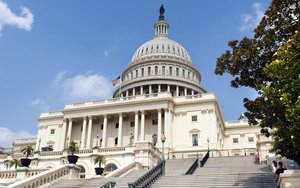 The House of Representatives passed a bill that could limit the Federal Communications Commission's ability to enforce net neutrality principles.
The House of Representatives passed a bill that could limit the Federal Communications Commission's ability to enforce net neutrality principles.
The
“No Rate Regulation of Broadband Internet Access Act," H.R. 2666, states that the FCC can't "regulate the rates charged for broadband Internet access service. The GOP-backed bill passed on
Friday by a vote of 241-173.
The White House has already signaled that President Obama will veto the measure, if it's also passed by the Senate.
Backers of the bill say it will codify
FCC Chairman Tom Wheeler's promises to refrain from telling broadband providers how much to charge for Web service. But net neutrality advocates say the bill is worded so broadly that it could
prohibit the FCC from policing Internet service providers that engage in price gouging, or that impose data caps that discourage subscribers from accessing online video.
Matt Wood, policy
director of the Free Press Action Fund, called the bill "a class congressional head fake."
"It claims to have one aim -- preventing the FCC from setting prices -- while actually preventing the
agency from protecting consumers or stopping cable monopolies from engaging in unreasonable practices," he said Friday in a statement.
Public Knowledge, which testified against the bill, added
that it will prevent the FCC from "investigating discriminatory data caps or making decisions around pay-for-privacy schemes in its privacy rules."
The FCC is considering new privacy rules for
broadband providers that would require them to obtain consumers' explicit consent before using data about their Web-surfing activity for ad targeting purposes. As part of its rulemaking procedure, the
agency asked for comment on whether broadband carriers should be permitted to charge customers
higher fees to avoid online behavioral advertising.
The wireless industry organization CTIA cheered news of the bill's passage, saying it will "restore the certainty necessary for providers to
increase their investment in new broadband infrastructure."